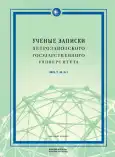BORROWED INTERJECTIONS IN THE RUSSIAN LANGUAGE
- Authors: Suprun V.I.1
-
Affiliations:
- Volgograd StateSocio-Pedagogical University
- Issue: Vol 46, No 1 (2024)
- Pages: 13-19
- Section: Articles
- URL: https://bakhtiniada.ru/2542-1077/article/view/293249
- DOI: https://doi.org/10.15393/uchz.art.2024.985
- ID: 293249
Cite item
Full Text
Abstract
The study was aimed at determining the ways of penetration of interjections from other linguistic culturesinto the Russian language, their adaptation to the language, and use in texts of various genres. For this purpose, generallinguistic methods were used, namely the descriptive, comparative, and typological ones. The article examines (from ahistorical perspective) twelve Russian interjections borrowed from the Greek, Church Slavonic, Turkic, and modernEuropean languages. The list of analyzed interjections in the Russian literary language has been almost exhausted. Thesource of the language material for this study was the data from dictionaries and texts of various genres, primarilyfiction. Borrowed interjections enter the Russian language orally and in writing, reflecting a variety of political,economic, cultural and other contacts of the Russian people with neighboring and more distant ethnic groups. Most ofthese units have entered the Russian language orally, so it is difficult to determine the time of their appearance in thelanguage, since words are always fixed in writing after they begin to be used orally. However, interjections are sometimesborrowed as a result of written interactions between languages. Having entered the Russian language, borrowings areintegrated into its phonetic system and are used in the appropriate syntactic positions. Since borrowed interjections haveno etymological connections with Russian words, they belong to primary units, although they may have a more complex phonetic composition than traditional primary interjections (ой, ах, фу, ого, ну, etc.). Russian interjections help to reveal the peculiarities of the ethnolinguistic culture of the Russian people and expressive potential of the Russian language.
About the authors
V. I. Suprun
Volgograd StateSocio-Pedagogical University
Author for correspondence.
Email: suprun@vspu.ru
Dr. Sc. (Philology)
References
- Galkina-Fedoruk, E. M. Modern Russian language: Lexicology, phonetics, morphology. Moscow, 2009. 408 p. (In Russ.)
- Ancient Greek for beginners. Part one. Moscow, 2002. 208 p. (Ad usum scholarum. Series Graeca). (In Russ.)
- Du, Xian. Pronounal-interjective complexes in the Russian artistic text and problems of their translation into Chinese. New Horizons of Russian Studies (Donetsk). 2022;18:69–73. (In Russ.)
- Kozarzhevsky, A. Ch. Textbook of the Ancient Greek language. Moscow, 2002. 456 p. (In Russ.)
- Russian Grammar. Vol. I: Phonetics. Phonology. Stress. Intonation. Word formation. Morphology. (N. Yu. Shvedova, Ed.). Moscow, 1980. 784 p. (In Russ.)
- Savostina, D. A. Interjection “oh” as a means of subjectivity in poetic speech. Bulletin of Moscow State Region University. Series: Russian Philology. 2011;2:34–38. (In Russ.)
- Jakobson, R. Marginalia to Vasmer’s Russian Etymological Dictionary (Р–Я). International Journal of Slavic Linguistics and Poetics. 1959;I/II:266–278.
Supplementary files








